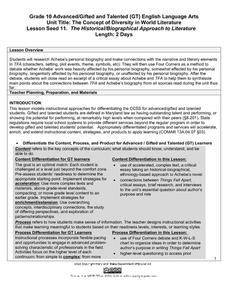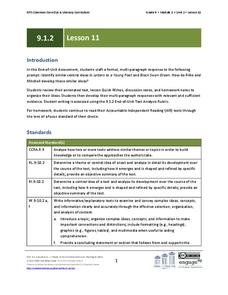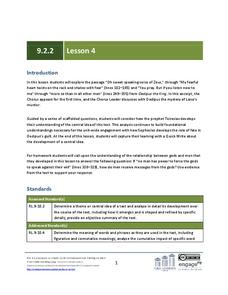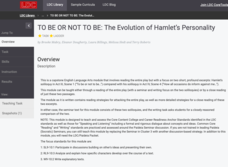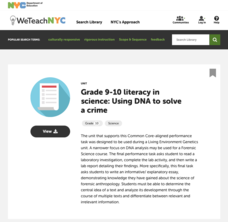Curated OER
Persuasive Speech Assignment
Practice using concrete evidence from various sources to back up an argument. The lesson emphasizes the use of support in a persuasive speech, as well as the importance of appealing to an audience's logic and emotions. You could modify...
Curated OER
Race and Crime in the United States: Are We Victims of Discrimination or Antiheroes?
Using methods adopted by Public Policy Analysts (PPA) class groups define a social problem, gather evidence to document the existence of the problem, identify causes, evaluate existing policies designed to deal with the problem, develop...
EngageNY
Grade 10 ELA Module 4: Unit 2, Lesson 6
What decisions might an author make about the structure of a play? Pupils participate in an evidence-based discussion about Shakespeare's choices in Macbeth. Next, scholars analyze the effect of Shakespeare's structural choices in Act 2,...
Polk Bros Foundation
Contrast Points of View
Compare two positions on the same topic and assess the positions for logical argument with a basic worksheet. Pupils fill in information about each position, note down which position is more logical, and compose a few sentences...
Curated OER
Global Warming: Writing and Editing a Research Report
Bring environmental issues into your classroom! Practice writing and peer editing research reports on global warming and the greenhouse effect. Middle schoolers can work on their research skills, their writing skills, and how to...
Curated OER
Writing Exercises: Russian Revolution, #2
Why did communism develop in an unindustrialized Russia? What human rights were violated under Joseph Stalin? And, how did the Soviet Union become industrialized? These are the writing prompts your class will work to answer with complete...
Curated OER
Fredrick Douglass' Speech on Women's Suffrage
“When a great truth once gets abroad in the world, no power on earth can imprison it, or prescribe its limits, or suppress it.” These words come from Frederick Douglass’ April, 1888 speech to the International Council of Women. One of...
The New York Times
Making Do: Learning and Growing Through Adversity
What is it that makes people keep going when they face challenges in life? Ask your class to consider this question in relation to their own experiences and as they read material from The New York Times. Using personal experiences and...
Curated OER
“Self Reliance” by Ralph Waldo Emerson
“Nothing is at last sacred but the integrity of your own mind.” Readers not only identify aphorisms in Emerson's "Self Reliance," but also find evidence of transcendental elements contained in the essay. They also demonstrate consistency...
iCivics
So You Think You Can Argue
What defines an argument, and how can someone properly formulate a counterargument? This resource provides two options—an interactive PowerPoint presentation or worksheet—that will support your learners as they begin to explore how to...
Jen London
Building an Argument
Collect evidence and reasons and fill them in on this page to prepare for presenting an argument. Learners can evaluate what they are missing and make sure they fill in each line and bubble before considering their argument complete.
Maryland Department of Education
The Concept of Diversity in World Literature Lesson 11: The Historical/Biographical Approach to Literature
How affected is Thinks Fall Apart by Chinua Achebe's personal biography? Using a four corners strategy, and evidence from their readings, class members debate the degree of biographical influence in Achebe's novel.
EngageNY
Grade 9 ELA Module 1, Unit 2, Lesson 11
As an end-of-unit assessment, class members craft a formal, multi-paragraph essay identifying a similar idea found in Rainer Maria Rilke's collection, Letters to a Young Poet, and David Mitchell's Black Swan Green. Writers state and use...
EngageNY
Grade 9 ELA Module 2: Unit 1, Lesson 13
Whether the planks hide the beating of a hideous heart or they break away to the madness beneath, their presence makes itself known in the final instructional activity of a literary analysis unit. Having gathered textual evidence from...
EngageNY
Grade 9 ELA Module 2, Unit 2, Lesson 4
The concept of sight, whether it's a lack of sight or abundant sight of the future, plays a vital role in Sophocle's Oedipus the King. Develop your ninth graders' literary vision with a lesson that connects the prophecy of Teiresias to...
EngageNY
Grade 9 ELA Module 2, Unit 2, Lesson 7
The accusations begin in Sophocles' Oedipus the King, with troublemakers and enemies abound. As learners delve deeply into the sights unseen, they review textual evidence from their readings to write about the importance of timing in the...
EngageNY
Grade 9 ELA Module 2, Unit 2, Lesson 11
Close readers and forensic detectives alike deal with collecting strong evidence. Ninth graders become involved in an instructional activity about Sophocles' Oedipus the King, in which they find connections between Oedipus' stated words...
EngageNY
Grade 9 ELA Module 3, Unit 3, Lesson 1
The opening exercise in this instructional unit introduces class members to the writing process they will follow to craft an informative, expository research paper that addresses their research question. To begin, writers are asked to...
EngageNY
Grade 9 ELA Module 4, Unit 1, Lesson 25
After analyzing the strengths and weaknesses of the evidence they have recorded on their argument outline tool, writers draft their essay's first body paragraphs, ensuring they have properly cited their source material.
Literacy Design Collaborative
To Be or Not to Be: The Evolution of Hamlet’s Personality
How does Hamlet's state of mind change over the course of Shakespeare's most famous revenge tragedy? After a close reading of Hamlet's soliloquies in Act III, scene 1 and Act IV, scene iv, class members engage in a Paideia/Socratic...
New York City Department of Education
Grade 9-10 Literacy in Science: Using DNA to Solve a Crime
Scholars become detectives and use science to solve a crime! A complete unit introduces DNA and includes hands-on activities that have learners model DNA and extract it from different food types. A culminating activity challenges...
Literacy Design Collaborative
Elie Wiesel's Acceptance Speech Analysis
Elie Wiesel's Nobel Prize Acceptance speech provides young historians with an opportunity to demonstrate their ability to use evidence from the speech. They work together to analyze how Wiesel uses rhetorical devices and syntax to...
Literacy Design Collaborative
"New American Characters" - Analyzing the Impact of Cultural Change in "The Great Gatsby"
Learners annotate text from The Great Gatsby before working through a character development map. They then use text evidence in a final essay to describe the connection between central ideas and character development.
EngageNY
Grade 10 ELA Module 4: Unit 2, Lesson 5
When Macbeth says, "Nature seems dead," he uses personification. Using the resource, scholars complete a Quick Write to analyze the impact of figurative language on the mood of Shakespeare's Macbeth. Pupils also participate in an...
Other popular searches
- Evidence of Evolution
- Evidence for Evolution
- Citing Textual Evidence
- Textual Evidence
- Evidence for Plate Tectonics
- Supporting Evidence
- Continental Drift Evidence
- Archaeological Evidence
- Dna Evidence for Evolution
- Cite Evidence in Text
- Evidence for Geologic Time
- Indirect Evidence













